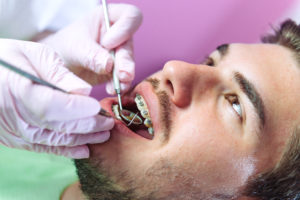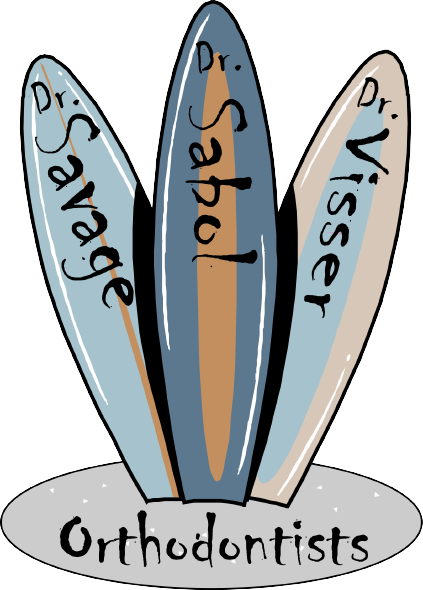Once the decision to get braces has been made, the whole process may seem quite daunting. The best advice is to follow the suggestions and instructions given by your orthodontist. He’s the professional and it’s his job to know the best options for your particular situation.
Having said that, it doesn’t hurt to have a basic knowledge of what you might expect as you embark on this transformational journey to a beautiful smile.
- Age Limit – While the stereotypical picture of someone with braces is a 14-year-old with a hand over their mouth trying not to smile, the truth is there is no age limit. From young children to older adults, almost anyone will benefit from correcting misalignment of teeth. Who doesn’t want a straight, gorgeous smile?
- What Braces Do – Without a doubt, straightening the teeth and having a smile you can be proud of is the most common reason people seek out an orthodontist and ask about braces. But wearing braces can also put your bite into alignment.
 Your bite has a great deal of influence on how well you’re able to properly speak and chew your food. A misaligned bite can also cause headaches and jaw pain. So the true purpose behind braces is to give you outstanding overall oral health.
Your bite has a great deal of influence on how well you’re able to properly speak and chew your food. A misaligned bite can also cause headaches and jaw pain. So the true purpose behind braces is to give you outstanding overall oral health.
- Build Good Habits – Braces help establish good oral hygiene habits. While you’re wearing braces, it’s critical to brush your teeth several times every day to keep food out of the braces. If you don’t brush well enough, you’ll begin to see tiny white spots on your teeth, indicating decalcification.
Another good hygiene habit you may want to consider cultivating is daily flossing. This helps keep the gums clean and the tooth surfaces under the wires free from food debris.
- Types of Braces – There are several different types of braces to choose from. The orthodontist will help guide you in making a decision about which style is right for you or your child. There are traditional metal braces, ceramic or clear braces, “invisible” braces that go on the back of the teeth and even a different type that’s removable.
If you or your child are set on a specific type, of course, make your preference known to the orthodontist. However, keep in mind the advice you get from the orthodontist will, in all likelihood, give you the best results.
- Cost of Braces – There are a number of factors that affect how much your braces will cost. The age of the patient, the condition of the teeth and the style of the braces you choose will all determine your final cost. On average, braces tend to run between $3000 and $7000. Generally speaking, the newer invisible style braces tend to be somewhat pricier. They cost more to manufacture, and they may require more of the orthodontist’s time.
- Length of Treatment – The length of the treatment typically ranges anywhere from 12 to 24 months. If you don’t follow the instructions given by the orthodontist, that length of time can be extended. If you don’t take good care of your teeth, that’s another reason you may have to keep the braces on longer than originally anticipated.
It’s important to realize how critical it is to take proper care of your teeth, not just while you’re wearing braces but after they’ve been taken off as well. Keep in mind the time you must wear braces is limited, and will eventually be over, but the results you get – a beautiful smile and straight teeth you can be proud of –will last you a lifetime.
- Discomfort from Braces – Braces will usually be uncomfortable in the beginning. Sometimes they can even be painful. There’s really no way to get around this, given the job they’re required to do. The pain typically comes from the continual pressure of the braces moving your teeth.
The brackets may be irritating to the inside of your mouth, but after a couple of weeks, things will get much better. In the meantime, Motrin or Tylenol can help relieve the pain, and it also helps to take your time when eating, making sure you’re chewing your food slowly.
Your teeth and gums are a lifelong responsibility. Braces can give your teeth the perfect alignment and can prompt you to create or continue good oral hygiene habits. But ultimately, the continued success of what your braces were able to do depends on your willingness to take care of your oral health, during and after the process.
It’s important to brush your teeth after every meal. Flossing daily should also become part of your oral hygiene routine.
After your braces are removed, you’ll need to wear a retainer in order to maintain the new alignment. Your orthodontist will give you specific instructions as to how often and how long you’ll need to wear it.
Poor oral hygiene or inconsistent use of your retainer as directed can undo everything you spent time, money and effort trying to accomplish. It’s easily prevented, so don’t let it happen to you. Give your mouth the proper care, follow the orthodontist’s instructions, and you’ll have a beautiful smile you can be proud of for the rest of your life.













